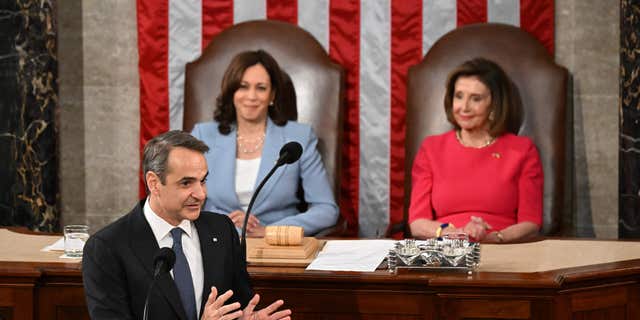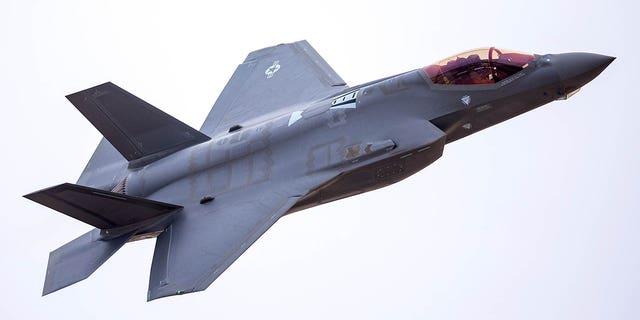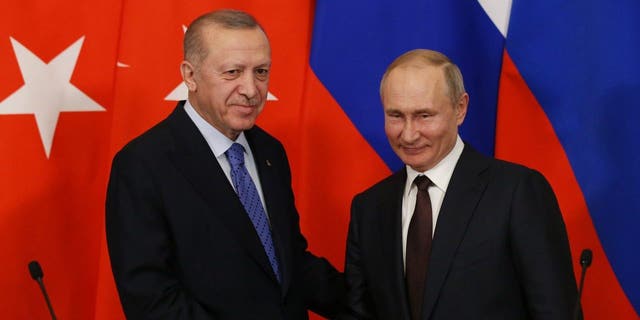Erdogan disrupts NATO unity amid Putin’s threat to European security
Internal NATO relations have become increasingly strained following Turkey’s apparent refusal to allow Sweden and Finland into the fold, with fellow NATO member Greece becoming the latest European nation on Turkish President Tayyip Erdogan’s chopping block.
Erdogan took a swing at Greek Prime Minister Kyriakos Mitsotakis this week when he accused him of attempting to block a U.S. arms sale of F-16 fighter jets to Ankara.
“There’s no longer anyone called Mitsotakis in my book,” he told reporters following a Monday cabinet meeting.
SWEDEN, FINLAND NATO BID: OFFICIALS TRAVEL TO TURKEY IN PUSH TO OVERCOME THEIR OBJECTIONS
The Turkish president also said he would refuse to meet his Greek counterpart for a previously planned summit later this year.
Erdogan’s comments came a week after the Greek prime minister met with U.S. lawmakers on Capitol Hill and urged them to consider NATO’s security when making “defense procurement decisions concerning the eastern Mediterranean.”
“We are always open to dialogue. But there is only one framework we can use to resolve our differences – international law and the unwritten principle of good neighborly relations,” Mitsotakis told U.S. lawmakers. “The last thing that NATO needs at a time when our focus is on helping Ukraine defeat Russia’s aggression is another source of instability on NATO’s southeastern flank.”
The Greek prime minister did not mention Erdogan or neighboring Ankara, but his comments alluded to a long-standing spat with Turkey over alleged airspace violations.
Turkey and Greece, both of whom are NATO members, have shared a complex relationship for more than a century. But Athens and Ankara’s latest tiff amid Russia’s aggression in Europe could spell trouble for the very military alliance that Russian President Vladimir Putin would like to see dismantled.

TURKEY NATO BLOCK MAY BE RELATED TO MILITARY EQUIPMENT DEMANDS: REPORTS
“All nations act in their own self-interest, all the time,” Michael Ryan, former deputy assistant secretary of defense for Europe and NATO, told Fox News. “[Erdogan] defines the Turkish self-interests and he defines how they pursue it. And in this case, he views Turkey as a rising regional power, and he is pushing hard in every direction to certain Turkish prerogatives.”
The NATO expert explained that the arms sale merely highlights several dynamics at play that Erdogan is juggling.
Turkey’s defenses have been lagging since Washington blocked Ankara from purchasing U.S. F-35 warplanes in 2019 after it purchased the Russian-made S-400 missile system.
The White House at the time said, “The F-35 cannot coexist with a Russian intelligence-collection platform that will be used to learn about its advanced capabilities.”
Turkey is looking to upgrade its air defense systems with modern U.S. F-16 aircraft not only to bolster its military capabilities amid its ongoing air disputes with Greece but to aid its operations in Syria.
“It’s a cat and mouse game,” Ryan said. “Congress really does have something that the Turks want.”
But he added that the “Turks have something that Congress wants – which is Sweden, Finland in NATO. That may be Erdogan’s play all along.”
TURKEY RISKS ‘HISTORIC’ SWEDEN, FINLAND NATO BID BY PRIORITIZING POLITICAL AGENDA

“The U.S. can’t have Erdogan calling the shots here,” European policy expert Nile Gardiner, director of The Heritage Foundation’s Margaret Thatcher Center for Freedom, told Fox News.
“All NATO allies need to be able to work together. It breaks down if you have one or two countries who are trying to derail the future of the alliance – which is what Turkey is doing,” he added.
The Greek prime minister’s veiled comments to U.S. lawmakers last week may have been an attempt to dissuade Washington from securing an arms sale with Turkey amid its NATO membership blockade.
Russia’s war in Ukraine has renewed the weight of NATO’s military alliance, particularly with regard to its Article 5 stipulation that says an attack on one country will trigger a united response from all 30 member nations.
Sweden and Finland formally requested to join NATO following Russia’s aggression in not only Ukraine but amid threats Moscow has issued against other European nations.
NATO military commanders championed the move to include Stockholm and Helsinki in the alliance and said it would bolster NATO defenses and identify “vulnerabilities” in Europe’s security.
But Turkey has used the opportunity to block the NATO bids over claims that Sweden and Finland have housed individuals it considers terrorists.
“The Turks are undermining NATO by taking this reckless stance,” Gardiner warned. “President Erdogan has a clear choice between either helping NATO or weakening it, and he needs to be on the right side of history here, instead of appeasing the Russians.”
Some foreign policy experts have suggested that Erdogan could be acting as Putin’s “Trojan horse” to strategically block NATO’s expansion and sow turmoil within the alliance.

But the former defense secretary for Europe and NATO rejected these claims.
“I don’t think it’s that simple, at all,” Ryan said. “Erdogan’s the kind of guy that he doesn’t want to be anybody’s lackey.
“He’s trying to balance his advantages while minimizing his disadvantages,” he added.
Read the full article Here


